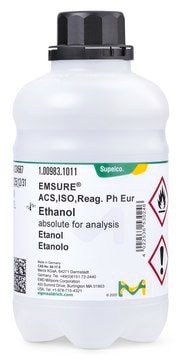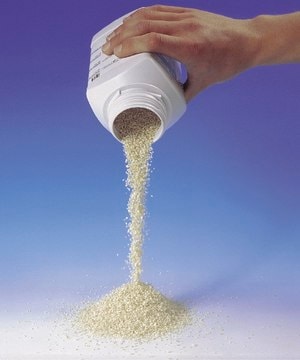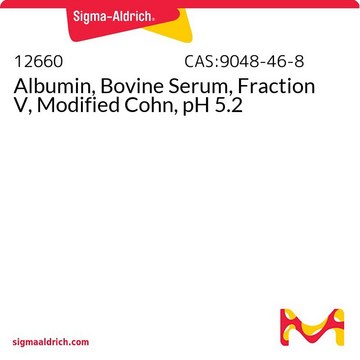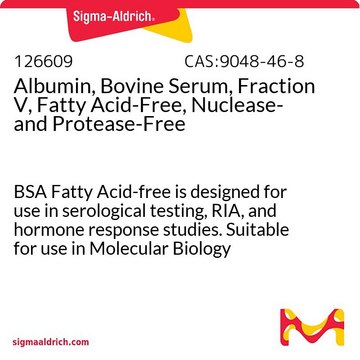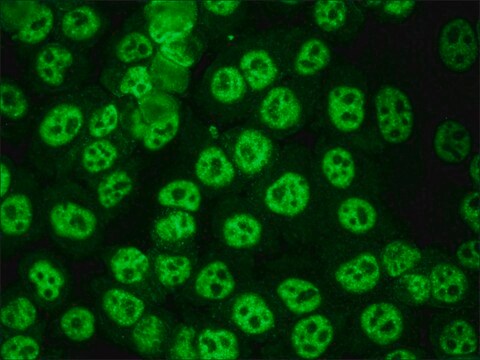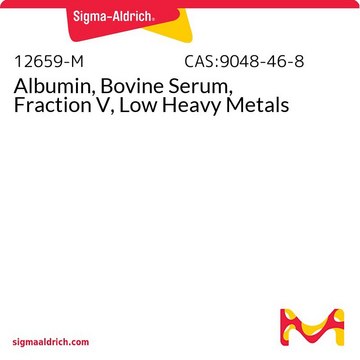1.12018
Albumin fraction V
(from bovine serum) for biochemistry
Sinónimos:
Albumin fraction V, Bovine serum albumin, Serum albumin
Iniciar sesiónpara Ver la Fijación de precios por contrato y de la organización
About This Item
Productos recomendados
formulario
solid
pH
6.8-7.2 (20 °C, 1 g/L in H2O)
solubilidad
1 g/L
densidad aparente
150 kg/m3
temp. de almacenamiento
2-8°C
Descripción general
Bovine serum albumin (BSA) belongs to the serum albumin family with three domains and two sub-domains each. This globular, α-helical, non-glycosylated protein has 17-disulfide bonds.
Aplicación
Albumin fraction V has been used:
- as a component of perfusion buffer for perfusion protocol for rodent organ perfusion
- as a blocking agent in western blot analysis
- as a nitrated protein standard to study the effects of antibodies against 3-nitrotyrosine and to characterize the binding and detection of nitrated proteins in one-sided and sandwich immunoassays
Acciones bioquímicas o fisiológicas
Bovine Serum Albumin (BSA) is the chief component of cell culture media and also works as a blocking agent in enzyme-linked immunosorbent assay (ELISA). It is beneficial for embryonic stem cells (hESC) differentiation and assists the transport of drugs, hormones, and fatty acids.
Nota de análisis
Appearance (colour): slightly yellow
Appearance (description): leafs
Assay of protein (spectralphotometric; calc. on anhydrous substance): ≥ 97.0 %
Assay of Albumin (Agarose gel electrophoresis): ≥ 98.0 %
pH-value (1 %; sodium chloride solution c = 0.5 mol/ l): 6.8 - 7.2
K (Potassium): ≤ 0.02 %
Na (Sodium): ≤ 0.5 %
Mg (Magnesium): ≤ 0.01 %
Ca (Calcium): ≤ 0.05 %
Heavy metals (as lead): ≤ 0.001 %
Fats: ≤ 0.2 %
Decomposition products: not detectable
Water (according to Karl Fischer): ≤ 5.00 %
Ash (600 °C): ≤ 1 %
NADH Oxidase (NADH; pH 7.5; 25° C): not detectable
LDH (pyruvate; pH 7.5; 25° C): not detectable
Appearance (description): leafs
Assay of protein (spectralphotometric; calc. on anhydrous substance): ≥ 97.0 %
Assay of Albumin (Agarose gel electrophoresis): ≥ 98.0 %
pH-value (1 %; sodium chloride solution c = 0.5 mol/ l): 6.8 - 7.2
K (Potassium): ≤ 0.02 %
Na (Sodium): ≤ 0.5 %
Mg (Magnesium): ≤ 0.01 %
Ca (Calcium): ≤ 0.05 %
Heavy metals (as lead): ≤ 0.001 %
Fats: ≤ 0.2 %
Decomposition products: not detectable
Water (according to Karl Fischer): ≤ 5.00 %
Ash (600 °C): ≤ 1 %
NADH Oxidase (NADH; pH 7.5; 25° C): not detectable
LDH (pyruvate; pH 7.5; 25° C): not detectable
Código de clase de almacenamiento
11 - Combustible Solids
Clase de riesgo para el agua (WGK)
WGK 3
Punto de inflamabilidad (°F)
Not applicable
Punto de inflamabilidad (°C)
Not applicable
Certificados de análisis (COA)
Busque Certificados de análisis (COA) introduciendo el número de lote del producto. Los números de lote se encuentran en la etiqueta del producto después de las palabras «Lot» o «Batch»
¿Ya tiene este producto?
Encuentre la documentación para los productos que ha comprado recientemente en la Biblioteca de documentos.
Los clientes también vieron
Sebastian Ivens et al.
Brain : a journal of neurology, 130(Pt 2), 535-547 (2006-11-24)
It has long been recognized that insults to the cerebral cortex, such as trauma, ischaemia or infections, may result in the development of epilepsy, one of the most common neurological disorders. Human and animal studies have suggested that perturbations in
Charlotte Bayer Christiansen et al.
American journal of physiology. Gastrointestinal and liver physiology, 315(1), G53-G65 (2018-03-02)
The colonic epithelium harbors a large number of endocrine cells, but little is known about the endocrine functions of the colon. However, the high density of glucagon like peptide-1 (GLP-1)- and peptide-YY (PYY)-secreting L cells is of great interest because
Kanika Singh et al.
Scientific reports, 10(1), 598-598 (2020-01-19)
Myocardial hypertrophy, an inflammatory condition of cardiac muscles is a maladaptive response of the heart to biomechanical stress, hemodynamic or neurohormonal stimuli. Previous studies indicated that knockout of Arginyltransferase (ATE1) gene in mice and embryos leads to contractile dysfunction, defective
Tamara Topală et al.
Clujul medical (1957), 87(4), 215-219 (2014-01-01)
The continuous search for new molecules with therapeutic abilities has led to the synthesis and characterization of a large number of metal complexes, proven to exhibit potential as pharmacological agents through their antibacterial, antiviral, antifungal and antineoplastic properties. As serum
Yuhong Xiao et al.
Journal of immunological methods, 384(1-2), 148-151 (2012-06-27)
The enzyme-linked immunosorbent assay (ELISA) is an extremely common and powerful laboratory technique for detecting proteins by antibodies. Researchers frequently use bovine serum albumin (BSA) as a blocking agent to prevent non-specific binding of antigens and antibodies to the microtiter
Nuestro equipo de científicos tiene experiencia en todas las áreas de investigación: Ciencias de la vida, Ciencia de los materiales, Síntesis química, Cromatografía, Analítica y muchas otras.
Póngase en contacto con el Servicio técnico
